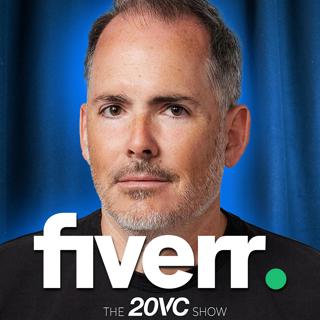
20Product: Loom CPO Janie Lee on Three Core Skills that Make the Best PMs, How to Find, Pick and Train the Best PM Talent and Lessons from OpenDoor and Rippling on Product Breadth, Pricing and Talent Density
Janie Lee is the Head of Product and the owner of the Self-Serve business at Loom. Janie previously worked at Rippling, leading the Identity Management and Hardware teams. Prior to that, she worked at...
14 Juni 20241h 2min

20VC: Scale's Alex Wang on Why Data Not Compute is the Bottleneck to Foundation Model Performance, Why AI is the Greatest Military Asset Ever, Is China Really Two Years Behind the US in AI and Why the CCPs Industrial Approach is Better than Anyone Else's
Alex Wang is the Founder and CEO @ Scale.ai, the company that allows you to make the best models with the best data. To date, Alex has raised $1.6BN for the company with a last reported valuation of $...
12 Juni 202459min

20VC: Reid Hoffman on Foundation Models: Who Wins & How Do Incumbents Respond | The Inflection AI Deal: How it Went Down | Why Trump is a Threat to Democracy | The Future of TikTok | Lessons from Sam Altman, Brian Chesky and the OpenAI Board
Reid Hoffman has been one of the most impactful people in technology over the last two decades. He is the Co-Founder of Linkedin (acq by Microsoft for $26BN) and Co-Founder of Inflection.ai. As an inv...
10 Juni 20241h 15min

20Sales: How Rippling Built Their Sales Machine: How to Hire, Train and Manage the Best SDRs, What is the Right Comp Package for Sales Teams & The Playbook to Start and Scale Your SDR Team
Ashley Kelly is the VP of Global Sales Development at Rippling, the all-in-one platform for HR, IT, and finance. Before Rippling, Ashley played a crucial role in scaling Brex's outbound sales from $2M...
7 Juni 202453min

20VC: Perplexity's Aravind Srinivas on Will Foundation Models Commoditise, Diminishing Returns in Model Performance, OpenAI vs Anthropic: Who Wins & Why the Next Breakthrough in Model Performance will be in Reasoning
Aravind Srinivas is the Co-Founder & CEO of Perplexity, the conversational "answer engine" that provides precise, user-focused answers to queries. Aravind co-founded the company in 2022 after working ...
5 Juni 202455min

This Week in SaaS: PluralSight Goes to Zero, Salesforce and Mongo Hit Hard, The Next IPO Candidates and How Do We Solve the Problem of Liquidity in Venture Capital
Jason Lemkin is one of the OG SaaS investors with all of his first five investments turning into unicorns with Pipedrive, Algolia, Talkdesk, Salesloft and RevenueCat all in his portfolio. SaaStr is th...
3 Juni 20241h 9min

20Growth: The Six Channels Startups Need to Dominate to Grow, Why the Best Growth Talent Never Comes from Marketing or Product, Who and How to Hire Growth Leaders and Teams and Why in a World of AI, Growth is More Science than Art with Matt Lerner
Matt Lerner is one of the OGs of growth having spent 11 years leading growth teams at PayPal. Post PayPal, Matt led the growth marketing program at 500 Startups. He is also the bestselling author of G...
31 Maj 202455min

20VC: Former Meta CTO, Schrep on Why Climate is a $10TRN Problem, Operating Lessons Scaling Products to Billions at Meta and Why the Best Leaders are Like Music Conductors
Mike Schroepfer (Schrep) is the Founder & Partner @ Gigascale Capital, a new kind of climate-focused investment firm. Prior to Gigascale, Mike was the CTO @ Meta where he scaled products to billions o...
29 Maj 20241h 10min






















